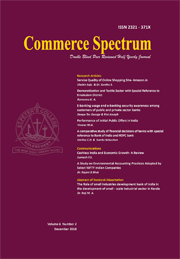Flawed Bank Credit in Kerala: A Negative Impetus to Economic Change
Author(s) : Dr. Suby BabyVolume & Issue : VOLUME 3 / 2015 , ISSUE 1
Page(s) : 6
Abstract
Obviously, most of the bank officials criticise target oriented lending as it dilutes the acts of chalking out eligible borrowers and monitoring proper credit utilisation. Eventually, it results in loan default and utilization gap. Ensuring proper scrutiny of loan applications, sanctioning of adequate credit and assessment of the impact of credit on the employment, income and asset of the borrowers are inevitable to calibrate the system of banking and its impact on the economy as a whole. Believably, the study found that sizeable number of borrowers are diverting their borrowings for purposes other than those specified while obtaining sanctions from the banks. Again, the impact of bank credit on income and assets generation of borrowers is also found to be meagre.
Keywords
Credit Diversion, Micro Small and Medium Enterprise (MSME), Asset Generation, Credit utilization
References
Chaudhry Kamran Naseer (2010) “Agriculture-credit is critical for the floodhit
farmers’ subsistence”, Business and Finance Review
Prasad, C.S. (2006) “Micro, Small and Medium enterprises financing in India:
Issues and concerns”, Cab Calling, July-Sept 2006, pp 35-40
World Bank Report (2010) “India: Priorities for agriculture and rural credit”, World Bank Report, http://go. World bank.org/8EFXZBL3Y0.
James Manalel (1994)“Role of incentives in the development of small scale industrial units in Kerala”, Ph.D Thesis, Cochin University.
Chakrabarty, K.C. (2010) “Bank Credit to MSMEs: Present Status and Way
Forward”, Micro Small and Medium Enterprises Report 2010, Institute of Small
Enterprises and Development (ISED), RBI, New Delhi
Kerala Economic Review (2009), Kerala Planning Board, Kerala
Rahji, M.A.Y. and Fakyode, S.B. (2009) “A multinomial logit analysis of agricultural credit rationing by commercial banks in Nigeria”, International Research Journal of Finance and Economics Issue .24, Nigeria.
Martin Petrick (2004), “Farm investment, credit rationing and governmentally
promoted credit access in Poland: a cross sectional analysis”, Food Policy, Issue.29,pp 275-294.Poland
Singh. S. K and Singh. S (2009), “Use of institutional credit for sustainable
agriculture production” GCRA, “International Conference on communication for
development in the information age: Extending benefits of technology for all”,
Banaras Hindu University, Varanasi.
.png)

